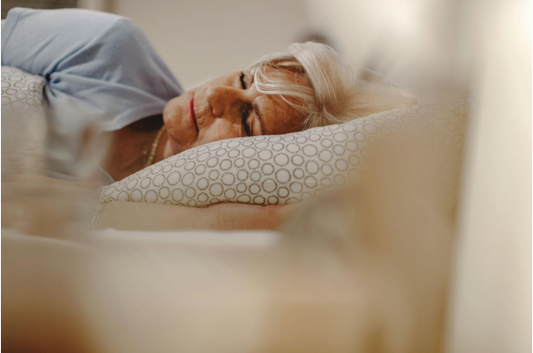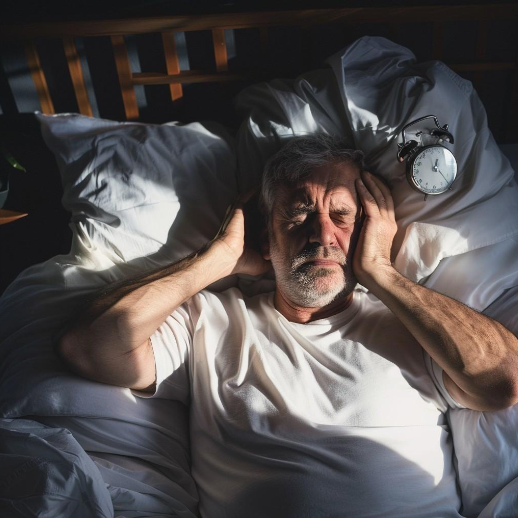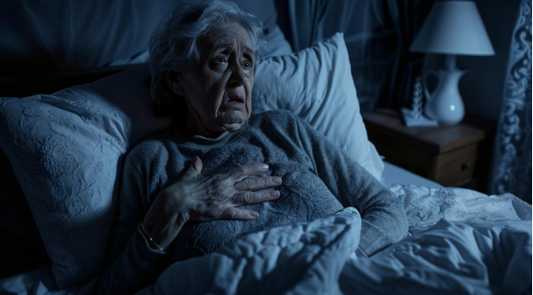As we age, getting a good night's sleep can become more challenging, particularly for older adults. Insomnia is increasingly common among the elderly, and it can have significant effects on overall health and well-being. While there are numerous medications available, many prefer to try home remedies that are often effective, more natural, and come with fewer side effects. From sipping chamomile tea to practicing mindfulness, these simple remedies can transform sleepless nights into restful slumbers. If you or your loved ones are struggling with insomnia, exploring these home solutions could be the key to sound sleep.
Understanding Insomnia in the Elderly
As we age, a good night's sleep can become elusive. Insomnia is a common sleep disorder affecting many older adults, causing trouble falling asleep or staying asleep. But why is it that our golden years come with restless nights? Let's look at the factors that contribute to insomnia among the elderly and explore its symptoms and effects on daily life.
Common Causes of Insomnia in Older Adults
Insomnia in older adults isn't just about tossing and turning. It's often linked to various factors, such as:
- Medication Side Effects: Many seniors take medications that can interfere with sleep. Drugs for blood pressure, asthma, or depression might keep folks awake.
- Chronic Pain: As bodies age, aches and pains can become constant companions. Conditions like arthritis or back pain can make lying in bed uncomfortable, disrupting restful sleep.
- Mental Health Issues: Anxiety or depression doesn't spare anyone by age. For the elderly, these issues can lead to sleepless nights, turning bedtime into a battleground of thoughts and worries.
Recognizing these causes is the first step in tackling insomnia, ensuring that nights are filled with rest instead of restlessness.
Symptoms and Effects of Insomnia
Have you ever functioned on just a few hours of sleep? It's not easy. Imagine dealing with that regularly. Insomnia can turn daily tasks into challenges. Here's how it impacts older adults:
- Cognitive Decline: Sleep is like a reboot button for the brain. Without enough of it, memory and focus can suffer, leading to forgetfulness or confusion.
- Mood Swings: A lack of sleep can turn even the sunniest personality into a grump. Irritability, mood swings, and even depression can be linked to poor sleep.
- Physical Fatigue: Sleep restores energy. Without it, everyday activities may feel exhausting, causing a vicious cycle of tiredness and inactivity.
Insomnia doesn't just rob sleep; it can steal vitality, making aging gracefully a bit more challenging. Understanding these effects helps in seeking solutions that can restore rest and improve quality of life.
Home Remedies for Better Sleep
Finding restful sleep can be a challenge for many elderly individuals. However, there are several home remedies that may help promote better sleep. These remedies focus on natural ingredients, relaxation techniques, and good sleep hygiene. Here’s a look at some effective options.
Herbal Teas and Natural Supplements
Certain herbal teas and natural supplements have long been used to aid sleep. They are often easy to prepare and can be a comforting part of a bedtime routine.
- Chamomile Tea: This popular herbal tea is known for its calming effects. Brew a cup using one tea bag or a teaspoon of dried chamomile flowers in hot water for about 5-10 minutes. Drinking this tea 30 minutes before bed can help signal your body that it's time to wind down.
-
Valerian Root: Known for its sedative properties, valerian root can be taken as a tea or in capsule form. If using the tea, steep one teaspoon of dried valerian root in hot water for 10-15 minutes. For capsules, follow the dosage instructions on the product label.
- Tart Cherry Juice: Tart cherry juice is rich in melatonin, a hormone that regulates sleep. Drink about 8 ounces of tart cherry juice in the evening, preferably about one hour before bedtime, to potentially improve sleep duration and quality.
Relaxation Techniques
Incorporating relaxation techniques into your bedtime routine can also support better sleep. Here are a few methods to consider:
- Meditation: Spending just a few minutes in meditation can help calm the mind. Sit in a comfortable position, close your eyes, and focus on your breathing. Even a five-minute practice can reduce stress.
- Deep Breathing Exercises: Try a simple breathing exercise where you inhale deeply through your nose for a count of four, hold for four, and exhale slowly through your mouth for a count of six. Doing this several times can promote relaxation.
- Mindfulness Practices: Engage in mindfulness by paying attention to the present moment. This might include focusing on your senses, such as the sound of your breathing or the feeling of your bed beneath you.
Sleep Hygiene Practices
Good sleep hygiene can make a significant difference in sleep quality. Consider these practices:
- Consistent Sleep Schedule: Going to bed and waking up at the same time every day helps regulate your body’s internal clock. Aim for 7-8 hours of sleep each night.
- Comfortable Sleep Environment: Ensure your bedroom is conducive to sleep. This includes a comfortable mattress and pillows, a cool room temperature, and minimal noise and light.
- Limit Screen Time: The blue light from screens can interfere with melatonin production. Try to avoid screens at least 30 minutes before bedtime. Instead, opt for reading a book or listening to calming music.
Implementing these home remedies can create a more peaceful sleep experience for the elderly. By trying different combinations of herbal teas, relaxation techniques, and maintaining good sleep hygiene, restful nights may soon follow.
Lifestyle Changes to Improve Sleep Quality
Making simple changes in daily habits can lead to better sleep quality for older adults. By focusing on regular physical activity and making mindful dietary choices, seniors can create a more restful sleep environment. Let’s explore how these lifestyle adjustments can enhance sleep.
Importance of Regular Physical Activity
Engaging in regular physical activity can significantly improve sleep quality. Exercise helps regulate the sleep-wake cycle, ensuring that older adults fall asleep more easily
and enjoy deeper sleep. You don’t need an intense workout regimen to reap the benefits. Here are some suitable activities for older adults:
- Walking: A daily stroll can do wonders for sleep. Aim for at least 30 minutes most days of the week.
- Yoga: Gentle yoga increases flexibility and reduces stress, making it easier to relax at night.
- Swimming: A great low-impact option, swimming is easy on the joints and can be refreshing.
- Stretching: Simple stretching exercises before bed can help ease tension and prepare the body for sleep.
Incorporating these activities into your routine not only helps improve sleep but also promotes overall health and well-being. Think of exercise as a natural sleep aid. Why not give it a try?
Dietary Considerations
What you eat can greatly influence how well you sleep. Certain foods promote rest, while others can keep you awake. Here’s what to consider:
Foods that Promote Sleep:
- Complex Carbohydrates: Foods like brown rice, oatmeal, and whole-grain bread can ease sleep onset.
- Lean Protein: Foods rich in protein, such as turkey and fatty fish, contain tryptophan, which aids in sleep.
- Fruits: Cherries and bananas are excellent choices. Cherries are a natural source of melatonin, the hormone that regulates sleep.
- Nuts: Almonds and walnuts provide healthy fats that support brain health during sleep.
Foods to Avoid:
- Caffeine: Be mindful of caffeine found in coffee, tea, and chocolate, especially in the afternoon and evening. Caffeine can disrupt sleep patterns.
- Heavy Meals: Avoid large meals right before bed. Digesting food can keep you awake.
- Alcohol: While it may seem to help you fall asleep, alcohol can actually interfere with sleep quality and disrupt REM sleep.
Making thoughtful dietary changes can be an effective strategy for better sleep. Imagine walking into a serene bedroom after a day of healthy eating and activity. You might find that restful sleep becomes a welcome reward.
Conclusion
A good night's sleep is crucial for the well-being of the elderly, and the home remedies explored can make a significant difference. Simple solutions like warm milk, chamomile tea, and consistent bedtime routines can help soothe insomnia.
Encourage seniors to incorporate relaxation techniques and gentle exercises into their daily routines.
Always remember that persistent sleep issues may require consultation with healthcare professionals. Prioritizing sleep not only enhances quality of life but also promotes overall health and happiness. What home remedy will you try first?
P.S.
If you are having difficulty with sleeping, you are not alone. There are many folks out there who want to know what the most effective natural sleep aid is to get them back to snoozing again. Fix My Sleep is a great resource for all those who have trouble sleeping and are looking for innovative tips and sleep products to help them get a good night’s sleep.





